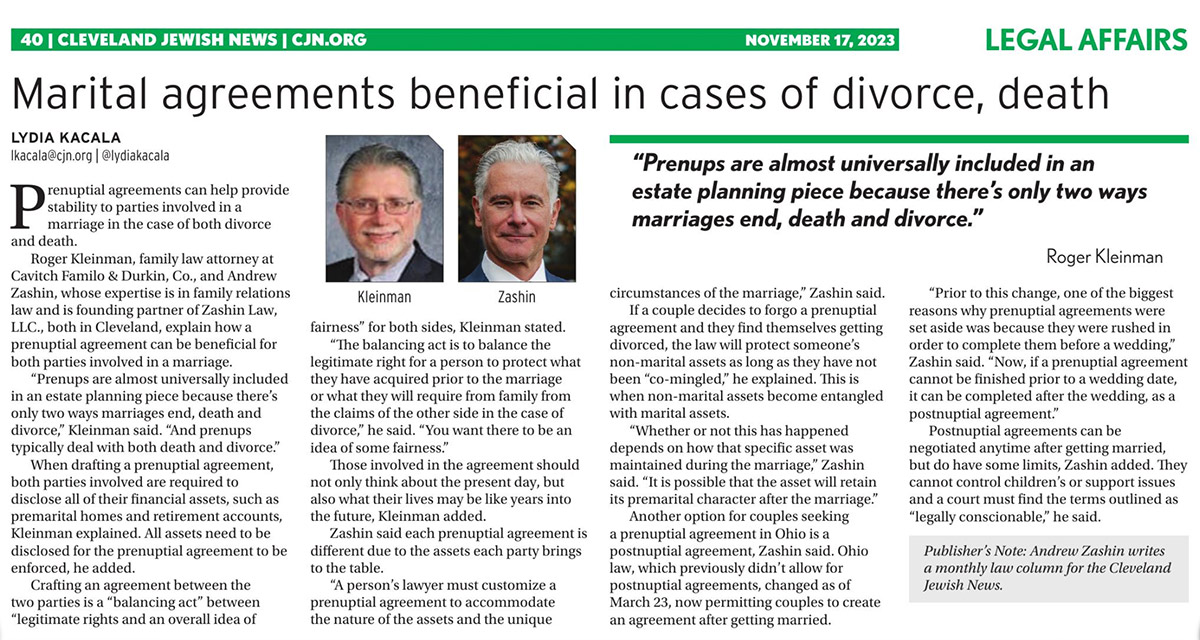
Cleveland Jewish News
Marital agreements beneficial in cases of divorce, death
November 16, 2023 | By Lydia Kacala | Andrew Zashin consulted and quoted
Prenuptial agreements can help provide stability to parties involved in a marriage in the case of both divorce and death.
Roger Kleinman, family law attorney at Cavitch Familo & Durkin, Co., and Andrew Zashin, whose expertise is in family relations law and is founding partner of Zashin Law, LLC., both in Cleveland, explain how a prenuptial agreement can be beneficial for both parties involved in a marriage.
“Prenups are almost universally included in an estate planning piece because there’s only two ways marriages end, death and divorce,” Kleinman said. “And prenups typically deal with both death and divorce.”
When drafting a prenuptial agreement, both parties involved are required to disclose all of their financial assets, such as premarital homes and retirement accounts, Kleinman explained. All assets need to be disclosed for the prenuptial agreement to be enforced, he added.
Crafting an agreement between the two parties is a “balancing act” between “legitimate rights and an overall idea of fairness” for both sides, Kleinman stated.
“The balancing act is to balance the legitimate right for a person to protect what they have acquired prior to the marriage or what they will require from family from the claims of the other side in the case of divorce,” he said. “You want there to be an idea of some fairness.”
Those involved in the agreement should not only think about the present day, but also what their lives may be like years into the future, Kleinman added.
Zashin said each prenuptial agreement is different due to the assets each party brings to the table.
“A person’s lawyer must customize a prenuptial agreement to accommodate the nature of the assets and the unique circumstances of the marriage,” Zashin said.
If a couple decides to forgo a prenuptial agreement and they find themselves getting divorced, the law will protect someone’s non-marital assets as long as they have not been “co-mingled,” he explained. This is when non-marital assets become entangled with marital assets.
“Whether or not this has happened depends on how that specific asset was maintained during the marriage,” Zashin said. “It is possible that the asset will retain its premarital character after the marriage.”
Another option for couples seeking a prenuptial agreement in Ohio is a postnuptial agreement, Zashin said. Ohio law, which previously didn’t allow for postnuptial agreements, changed as of March 23, now permitting couples to create an agreement after getting married.
“Prior to this change, one of the biggest reasons why prenuptial agreements were set aside was because they were rushed in order to complete them before a wedding,” Zashin said. “Now, if a prenuptial agreement cannot be finished prior to a wedding date, it can be completed after the wedding, as a postnuptial agreement.”
Postnuptial agreements can be negotiated anytime after getting married, but do have some limits, Zashin added. They cannot control children’s or support issues and a court must find the terms outlined as “legally conscionable,” he said.
Publisher’s Note: Andrew Zashin writes a monthly law column for the Cleveland Jewish News.
